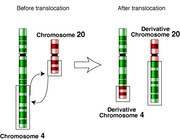In genetics, a chromosome translocation is a chromosome abnormality caused by rearrangement of parts between nonhomologous chromosomes. It is detected on cytogenetics or a karyotype of affected cells. There are two main types, reciprocal (also known as non-Robertsonian) and Robertsonian. Also, translocations can be balanced (in an even exchange of material with no genetic information extra or missing, and ideally full functionality) or unbalanced (where the exchange of chromosome material is unequal resulting in extra or missing genes).
Reciprocal (non-Robertsonian) translocations
Reciprocal translocations are usually an exchange of material between nonhomologous chromosomes. They are found in about 1 in 600 human newborns. Such translocations are usually harmless and may be found through prenatal diagnosis. However, carriers of balanced reciprocal translocations have increased risks of creating gametes with unbalanced chromosome translocations leading to miscarriages or children with abnormalities. Genetic counseling and genetic testing is often offered to families that may carry a translocation.
Robertsonian translocations
This type of rearrangement involves two acrocentric chromosomes that fuse near the centromere region with loss of the short arms. The resulting karyotype in humans leaves only 45 chromosomes since two chromosomes have fused together. Robertsonian translocations have been seen involving all combinations of acrocentric chromosomes. The most common translocation in human involves chromosomes 13 and 14 and is seen in about 1 in 1300 persons. Like other translocations, carriers of Robertsonian translocations are phenotypically normal, but there is a risk of unbalanced gametes which lead to miscarriages or abnormal offspring. For example, carriers of Robertsonian translocations involving chromosome 21 have a higher chance to have a child with Down syndrome.
Some human diseases caused by translocations are:
- Cancer: several forms of cancer are caused by translocations; this has been described mainly in leukemia (acute myelogenous leukemia and chronic myelogenous leukemia).
- Infertility: one of the would-be parents carries a balanced translocation, where the parent is asymptomatic but conceived fetuses are not viable.
- Down syndrome is caused in a minority (5% or less) of cases by a Robertsonian translocation of about a third of chromosome 21 onto chromosome 14.
By chromosome
Denotation
The International System for Human Cytogenetic Nomenclature (ISCN) is used to denote a translocation between chromosomes. The designation t(A;B)(p1;q2) is used to denote a translocation between chromosome A and chromosome B. The information in the second set of parentheses, when given, gives the precise location within the chromosome for chromosomes A and B respectively—with p indicating the short arm of the chromosome, q indicating the long arm, and the numbers after p or q refers to regions, bands and subbands seen when staining the chromosome with a staining dye. See also the definition of a genetic locus.
- t(2;5)(p23;q35) - anaplastic large cell lymphoma
- t(8;14) - Burkitt's lymphoma (c-myc)
- t(9;22)(q34;q11) - Philadelphia chromosome, CML, ALL
- t(11;14) - Mantle cell lymphoma (Bcl-2)
- t(11;22)(q24;q11.2-12) - Ewing's sarcoma
- t(14;18)(q32;q21) - follicular lymphoma (Bcl-2)
- t(17;22) - dermatofibrosarcoma protuberans
- t(15;17) - acute promyelocytic leukemia
- t(1;12)(q21;p13) - acute myelogenous leukemia
- t(9;12)(p24;p13) - CML, ALL (TEL-JAK2)
- t(X;18)(p11.2;q11.2) - Synovial sarcoma
- t(1;11)(q42.1;q14.3)- Schizophrenia
- t(12;15)(p13;q25) - (TEL-TrkC); acute myeloid leukemia, congenital fibrosarcoma, secretory breast carcinoma












No comments:
Post a Comment